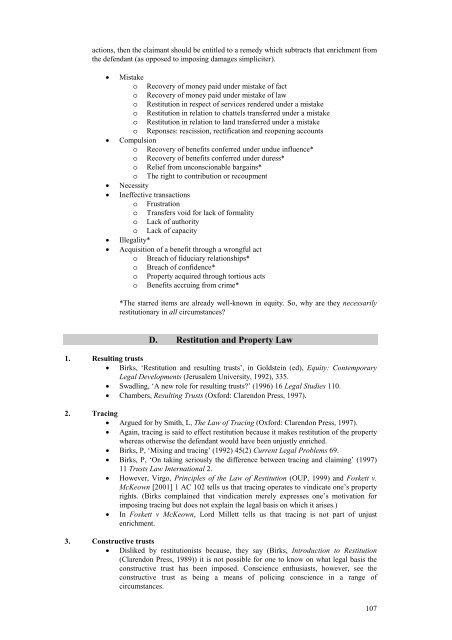Soton Equity and Trusts - alastairhudson.com
Soton Equity and Trusts - alastairhudson.com
Soton Equity and Trusts - alastairhudson.com
Create successful ePaper yourself
Turn your PDF publications into a flip-book with our unique Google optimized e-Paper software.
actions, then the claimant should be entitled to a remedy which subtracts that enrichment from<br />
the defendant (as opposed to imposing damages simpliciter).<br />
<br />
<br />
<br />
<br />
<br />
<br />
Mistake<br />
o Recovery of money paid under mistake of fact<br />
o Recovery of money paid under mistake of law<br />
o Restitution in respect of services rendered under a mistake<br />
o Restitution in relation to chattels transferred under a mistake<br />
o Restitution in relation to l<strong>and</strong> transferred under a mistake<br />
o Reponses: rescission, rectification <strong>and</strong> reopening accounts<br />
Compulsion<br />
o Recovery of benefits conferred under undue influence*<br />
o Recovery of benefits conferred under duress*<br />
o Relief from unconscionable bargains*<br />
o The right to contribution or recoupment<br />
Necessity<br />
Ineffective transactions<br />
o Frustration<br />
o Transfers void for lack of formality<br />
o Lack of authority<br />
o Lack of capacity<br />
Illegality*<br />
Acquisition of a benefit through a wrongful act<br />
o Breach of fiduciary relationships*<br />
o Breach of confidence*<br />
o Property acquired through tortious acts<br />
o Benefits accruing from crime*<br />
*The starred items are already well-known in equity. So, why are they necessarily<br />
restitutionary in all circumstances?<br />
1. Resulting trusts<br />
<br />
D. Restitution <strong>and</strong> Property Law<br />
Birks, ‘Restitution <strong>and</strong> resulting trusts’, in Goldstein (ed), <strong>Equity</strong>: Contemporary<br />
Legal Developments (Jerusalem University, 1992), 335.<br />
Swadling, ‘A new role for resulting trusts?’ (1996) 16 Legal Studies 110.<br />
Chambers, Resulting <strong>Trusts</strong> (Oxford: Clarendon Press, 1997).<br />
2. Tracing<br />
Argued for by Smith, L, The Law of Tracing (Oxford: Clarendon Press, 1997).<br />
Again, tracing is said to effect restitution because it makes restitution of the property<br />
whereas otherwise the defendant would have been unjustly enriched.<br />
Birks, P, ‘Mixing <strong>and</strong> tracing’ (1992) 45(2) Current Legal Problems 69.<br />
Birks, P, ‘On taking seriously the difference between tracing <strong>and</strong> claiming’ (1997)<br />
11 <strong>Trusts</strong> Law International 2.<br />
However, Virgo, Principles of the Law of Restitution (OUP, 1999) <strong>and</strong> Foskett v.<br />
McKeown [2001] 1 AC 102 tells us that tracing operates to vindicate one’s property<br />
rights. (Birks <strong>com</strong>plained that vindication merely expresses one’s motivation for<br />
imposing tracing but does not explain the legal basis on which it arises.)<br />
In Foskett v McKeown, Lord Millett tells us that tracing is not part of unjust<br />
enrichment.<br />
3. Constructive trusts<br />
Disliked by restitutionists because, they say (Birks, Introduction to Restitution<br />
(Clarendon Press, 1989)) it is not possible for one to know on what legal basis the<br />
constructive trust has been imposed. Conscience enthusiasts, however, see the<br />
constructive trust as being a means of policing conscience in a range of<br />
circumstances.<br />
107













